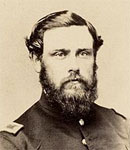 Open main menu
Open main menu
 Open main menu
Open main menu

L. Reed
(1842 - 1925)
Home State: Massachusetts
Command Billet: Soldier
Branch of Service: Infantry
Before Antietam
As War broke out in 1861, young Lewis was a "stitcher" in Abington proper, a town about 20 miles south of Boston known for its "boot and shoe establishments". He enlisted on 8 July 1861 as Corporal in Company G of the new 12th Massachusetts Infantry. By the end of his service with the Twelfth he had been promoted to Sergeant, but it's not clear when. The Twelfth served in the Shenandoah Valley under Banks, in Northern Virginia with Pope, and at Cedar Run and Second Bull Run before embarking with the Army of Potomac for Maryland.
On the Campaign
At Antietam Reed and the 12th Infantry fought in the Cornfield as part of General Hooker's First Army Corps. Colonel Coulter, commanding the Brigade, reported:
The Twelfth Massachusetts had killed and disabled eleven officers of fifteen taken into the field. The loss of this regiment, owing to its position, was by far the most severe in the brigadeÖAmong the wounded on that fateful morning was Corporal Reed.
The rest of the War
He was away from the Regiment recovering until March 1863. The Twelfth saw action thereafter at Chancellorsville and Gettysburg.
On 9 July 1863 Reed was appointed 2nd Lieutenant in the 54th Massachusetts Volunteer Infantry, a unit of black troops initially authorized by Governor Andrews in late January 1863. He resigned from the 12th Infantry in October or November, and reported and mustered into the 54th Regiment near Charleston, South Carolina on 26 November. The 54th, famous for its assault on Battery Wagner of 18 July 1863, was by then supporting artillery bombardment of Charleston itself.
Soon after, in February 1864, Reed and the 54th were in action at Olustee, Florida, and, with the rest of the Federal force, retired to Jacksonville after defeat there.In March Reed was promoted 1st Lieutenant, and in mid-April the Regiment was withdrawn by steamship transports from Florida to Morris Island in Charleston Harbor, facing the "utter stagnation of active operations in the department".
There was some action in the assault on James Island in July, but otherwise the men were assigned tedious seige duties at Charleston. The unit only saw combat again on 30 November at the end of the failed expedition to Honey Hillñwhere Reed commanded Company Iñand finally, in one of the last battles of the War, at Boykin's Mill on 18 April 1865.
After the War
In June, after War's end, Lewis Reed was promoted to Captain and given command of Company K. He mustered out with the Regiment at the expiration of their term of service, and served briefly as Provost Judge at Charleston before mustering out of Volunteer service on 20 August 1865.
Probably living in Massachusetts after the War, Lewis Reed died at Rockland in 1925 at about 83 years of age.
References & notes
Biographical information for Lewis Reed provided by descendants Robert and Lesa McFadden. Details of his Army service are from A Brave Black Regiment by Capt Luis F. Emilio (2nd ed., 1894), reissued by DeCapo Press (1995)1. Thanks to Lesa McFadden for the pointer to that volume. The photo here from a CDV sold by Cowan's in 2008.
Birth
10/26/1842; East Abington, MA
Death
1925; Rockland, MA
1 Emilio, Luis F., A Brave Black Regiment, Boston: Boston Book Company, 1891 [AotW citation 604]